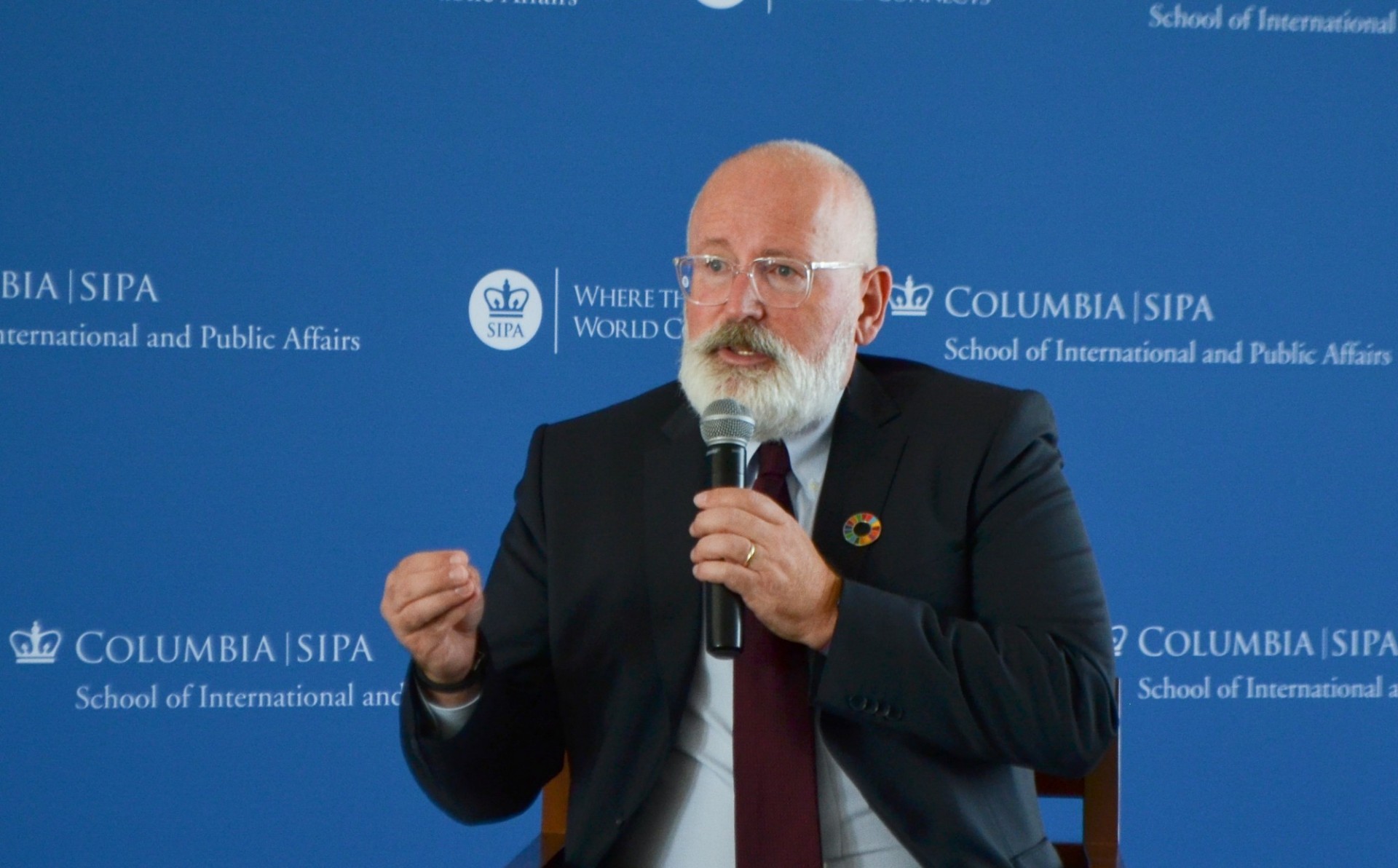Commentary: "Frans Timmermans and the Art of Disagreeing Well"

Frans Timmermans has a clear vision for Europe. At a town hall meeting at Columbia University during UN week, he articulated that plan enthusiastically. The room at the School of International and Public Affairs hung on every word of the Executive Vice President designate of the European Commission as he answered questions about climate policy, Europe’s role in global politics, and the future of the European Union. Seemingly invigorated by an election campaign in which his center-left coalition outperformed expectations amid fears of a right-wing nationalist wave, Mr. Timmermans was eager to project a progressive, ambitious platform for Europe and its role in the world.
Mr. Timmermans, a leading member of the Party of European Socialists whose new role in European leadership will be to oversee the European Green Deal, spent much of the hour-long town hall discussing climate change. To the Americans in the room, the ambition of the new European Commission likely came as a bit of a shock. The task? Enacting legislation within the first 100 days of the new government that will allow for a 50 percent reduction of emissions by 2030, with the eventual goal of an emission neutral Europe by 2050.
Mr. Timmermans, who currently serves as First Vice President of the European Commission, seemed hopeful at the prospect of getting legislation through, but the specter of push-back from coal producing nations in Central and Eastern Europe loomed large; when asked whether ambition was an asset or a crutch, Mr. Timmermans was quick to point to vocational adjustment training programs—which would retrain workers who lose their jobs in an increasingly emission-free economy—as a centerpiece of the plan.
Though climate change dominated the event, the audience was also eager to ask about geopolitics and internal strife in Europe. Surprisingly, the audience did not bring up Brexit, which allowed other equally pressing issues to come to the fore. Exchanges about Russia, a changing geopolitical landscape, and the European way of life played to Mr. Timmermans’ strengths as a politician and provided some of the most memorable soundbites of the afternoon.
Asked about the future of multilateralism and the emergence of China on the world stage, Mr. Timmermans advocated for a stronger Europe in world affairs and pointed to the challenges of shifting global demographics. While he was steadfast in his belief that Europe “has a vested interest… to prevent a bipolar world from happening and [to] create a multipolar world,” Mr. Timmermans called into question the US mode of projecting power globally: “The attractiveness of America is not its military power, it’s its way of life and its values; If [Europe and the US] are smaller parts of the world’s population, our way of life… will be a much more powerful tool than military might… We need to rekindle this feeling that our way of life and our values are things that are seen as attractive by the rest of the world.”
The concept of the European “way of life” also played a part in the most pointed exchange of the afternoon. Asked to elaborate on the concept in the context of rising right-wing nationalism, Mr. Timmermans depicted the social safety net, affordable higher education, and universal health care as uniquely European, but not necessarily limited to Europe in practice:
“What we don’t want to do is to say that the European way of life is in very distinct opposition to other cultures and other religions… The European way of life is also offering safe refuge to people who flee from war and persecution. If we give that up, we give up on our fundamental values. Let me be very clear. The European way of life is not [what] Mr. Orban defines it [to be].”
Given that Mr. Timmermans was representing the newly elected European Commission abroad, it’s hard to fault him for projecting ambition. And while there does seem to be significant momentum toward passing the legislation necessary to set the ambitious climate portfolio in motion, the vision of Europe as a global beacon of democracy, equality and decency is unfortunately mired in contention. As the new European Commission takes office, it will have to continue to grapple with forces throughout Europe advocating for a weaker, less prominent Union.
Luckily, the new European Commission has an asset in Mr. Timmermans, who has a proven track record of confronting illiberal forces in the European Union despite the political cost. When the new Commission takes office in November, it will take considerable effort to overcome the aforementioned obstacles and achieve the ambitious goals laid out by Commission President-elect Ursula von der Leyen in her agenda for Europe. That is not to say the new Commission won’t be prepared to find middle ground. And despite the considerable ambition of his new office, Mr. Timmermans hinted at a willingness to attempt to bridge Europe’s gaps: “We tend to only talk to people who already agree with us, and to avoid confrontation with whom we disagree. The European Union can never function like that because we have so many differences. in a democracy, the art of disagreeing well is the only way forward… finding common ground between different interests in the only way Europe can operate.” That willingness to find common ground will be important over the next five years, which are crucial for the future of Europe and the world.
William Naylor is an MA Student in the European History, Politics, and Society program at the European Institute, Columbia University.
The views expressed in this article are those of the author and do not necessarily reflect the views of the European Institute.